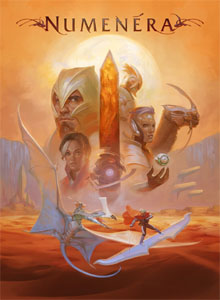 Numenera features player-facing mechanics: Whenever an action requires diced resolution, it’s always the player who rolls the dice. If a PC is being attacked, the player rolls to dodge. If the PC is attacking, the player rolls to hit. There are a lot of advantages to this system, particularly in the ways that it seamlessly interacts with the pool-spend, GM intrusion, and difficulty adjustment mechanics.
Numenera features player-facing mechanics: Whenever an action requires diced resolution, it’s always the player who rolls the dice. If a PC is being attacked, the player rolls to dodge. If the PC is attacking, the player rolls to hit. There are a lot of advantages to this system, particularly in the ways that it seamlessly interacts with the pool-spend, GM intrusion, and difficulty adjustment mechanics.
But the drawback of player-faced mechanics is that they can’t be used to resolve contests between NPCs. Numenera opts for one of two relatively straightforward work-arounds (to be used at the GM’s discretion):
(1) In keeping with other mechanics in the system, the NPC with the highest level automatically succeeds.
(2) If that’s undesirable for some reason, “the GM should designate a player to roll for one of the NPCs. Often, the choice is obvious. For example, a character who has a trained attack animal should roll when her pet attacks enemies.”
The problem with this method is that, because of the way NPC stat blocks and pools work in Numenera, the result doesn’t factor in the NPC’s skill whatsoever: There is no modifier applied to the roll, so an NPC that’s level 2 at attacking has the exact same chance of hitting an NPC opponent as an NPC that has a level 7 attack.
What makes the problem even more vexing is that a large number of character options feature allied NPCs (like the aforementioned trained attack animal).
NPC ALLIES
NPC allies have an effort pool equal to level x 3 per day.
NPC allies also gain one recovery roll per day. This recovery roll can be used as an action at any time, restoring 1d6 + level points to their effort pool.
When rolling for an NPC, adjust the die roll by +1 or -1 per difference in level. For example, a level 5 NPC attempting a level 3 task would gain a +2 bonus to their die roll. The same NPC attempting a level 7 task would suffer a -2 penalty to their die roll.
DESIGN NOTES
These rules are short, simple, and to the point. They present a minor disruption to the purely player-faced mechanics, but without bulking out an NPC to have the same complexity as a PC. (In terms of utility, it’s particularly important that the mechanics don’t actually require a specialized NPC stat block: The effort pool can be easily derived from any existing NPC or creature.)
In actual play, the addition of the effort pool provides just enough interest to make running an NPC ally interesting while the level adjustment to the die roll for NPC vs. NPC actions provides enough distinction between characters that their interactions don’t feel flat or artificial.
These rules can be found in the “House Rules” section of my Numenera system cheat sheet.












One problem with this house rule is that it doesn’t help in reproducing the results of the first approach: Assume two Level 10 Kaiju-sized enemies are fighting. As long as no PC is involved, both sides according to the first guideline will just be in an eternal stalemate.
Now, if the PCs ally with one side and thus get to roll, that stalemate gets incredibly lop-sided, because Godzilla (if that is who the players allied with) now has to roll against a Difficulty 10 to hit Kong (impossible) and a Difficulty 10 to defend against him (impossible). 3 rounds after the PCs declare their allegiance, their ally is down. Your house rule fix does not change this outcome, because the level difference is 0 and thus nothing is adjusted.
To replicate that stalemate, one needs to adjust the difficulties such that for a mirror match, the chances to both hit and be hit are 50%.
A simple method to do so is the following:
An NPC allys difficulty for a task is modified according to their difference to level 4. So a Level 2 ally has all difficulties increased by 2, while a level 7 ally has all difficulties decreased by 3 steps.
This gives a lower than 50% chance to hit for mirror matches, to compensate for the fact that player attacks have a higher chance to deal bonus damage (nat 17+) than enemy attacks (only on nat 1).
I also think it would be more in line with how player characters work if instead of introducing an Effort pool for NPCs, they have to apply Effort by spending HP. After all, that is what player characters are doing as well.